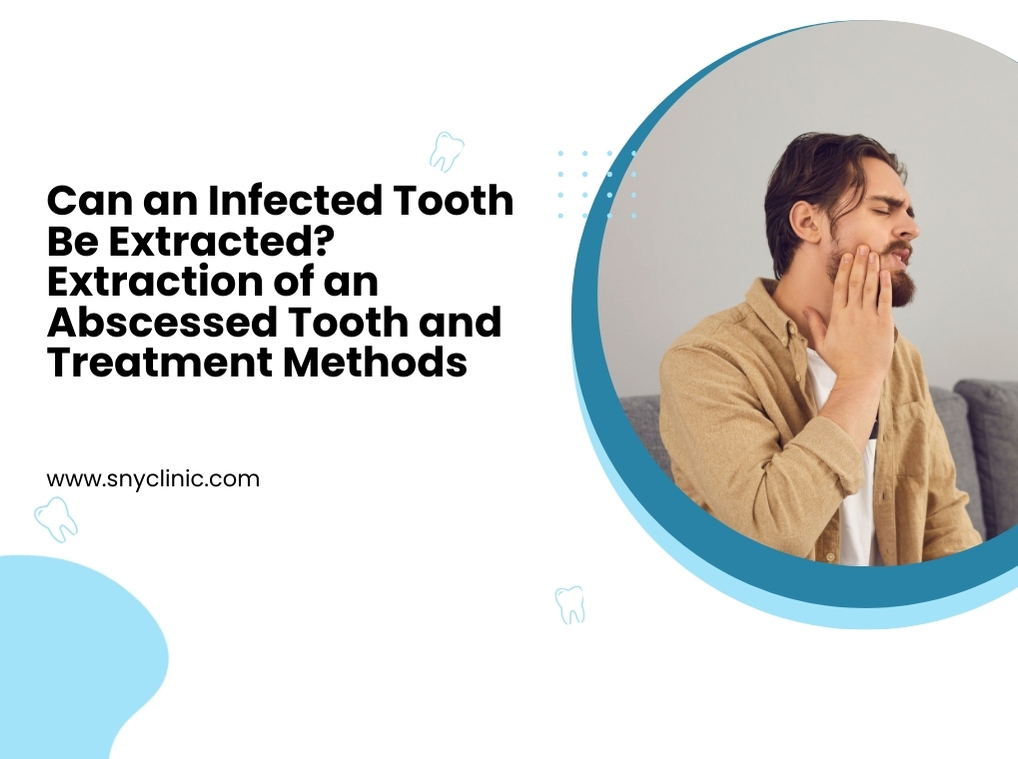
Can an Infected Tooth Be Extracted? Extraction of an Abscessed Tooth and Treatment Methods
Can an Infected Tooth Be Extracted? Extraction of an Abscessed Tooth and Treatment Methods
Oral and dental health play a critical role in maintaining our overall well-being. However, the busy pace of daily life, poor dietary habits, or neglecting regular dental check-ups can eventually lead to serious issues such as infections and abscesses in the teeth. At this point, one of the most common questions patients ask is: Can an infected tooth be extracted? Especially when it comes to abscessed teeth, the extraction process and treatment methods require accurate knowledge. In this article, we will thoroughly examine when an infected tooth can be extracted, in which cases it should be postponed, and what alternative treatment options are available.
What is Tooth Infection and Abscess?
A tooth infection usually develops as a result of cavities, gum problems, or trauma. As the cavity deepens and reaches the nerves, bacteria can progress to the root tip, leading to inflammation.
A dental abscess, on the other hand, is the advanced stage of this inflammation. An abscess occurs when pus accumulates at the root tip of the tooth or around the gums. It presents with symptoms such as severe pain, throbbing, swelling in the face, fever, and fatigue. If left untreated, it can turn into a serious condition that threatens both oral and general health.
Can an Infected Tooth Be Extracted?
One of the most frequently asked questions is, “Can an infected tooth be extracted?” Theoretically, an infected tooth can be extracted, but extraction is not recommended during the active phase of infection. The reasons are as follows:
- Reduced effect of anesthesia: The acidic environment in the infected area significantly lowers the effectiveness of local anesthesia, which may cause severe pain during extraction.
- Risk of infection spreading: During extraction, bacteria may enter the bloodstream, increasing the risk of the infection spreading to other areas.
- Swelling and technical difficulty: Due to the swelling in the inflamed area, extraction becomes technically more difficult, and the healing process may be prolonged.
Therefore, dentists usually prefer to control the infection first rather than immediately extracting an abscessed tooth.
Methods Applied in the Extraction of an Abscessed Tooth
In cases of abscessed tooth extraction, dentists generally follow these steps:
1. Controlling the Infection
Depending on the severity of the infection, the dentist may start antibiotic treatment. This treatment may last 5-7 days. Once the infection and swelling subside, the extraction can be performed more safely.
2. Abscess Drainage
If the abscess is large, the dentist may first drain it. This procedure reduces pressure and helps relieve pain.
3. Tooth Extraction
After the infection is under control, the tooth extraction is carried out. This way, the patient feels less pain during the procedure, and the risk of complications is minimized.
4. Post-Treatment Planning
After extraction, possible solutions such as implants, bridges, or dentures are considered to address the problems caused by tooth loss.
Alternative Treatments for Infected Teeth
Not every abscessed tooth must be extracted. In some cases, saving the tooth is possible:
- Root Canal Treatment: If the tooth structure is suitable, the root canals can be cleaned and filled, allowing the tooth to remain in the mouth.
- Gum Treatment: If the abscess originates from the gums, periodontal treatment can be performed to remove the infection.
- Medication: Supportive treatments with antibiotics, painkillers, and antiseptic mouthwashes may be applied.
Risks of Extracting an Infected Tooth
Like any surgical procedure, extracting an infected tooth carries certain risks:
- The infection may spread.
- Severe pain and prolonged sensitivity may occur.
- Healing time may be extended.
- Another abscess may form at the extraction site.
Therefore, extractions should always be performed under the supervision of a specialist dentist and in sterile conditions.
Post-Extraction Care Tips
To speed up the healing process after an abscessed tooth extraction, it is important to pay attention to the following points:
- Avoid spitting and rinsing for the first 24 hours.
- Apply an ice pack to the extraction area to reduce swelling.
- Avoid smoking and alcohol consumption.
- Take antibiotics and painkillers as prescribed by your dentist.
- Maintain oral hygiene by brushing your teeth with a soft-bristled toothbrush.
What Happens If an Infected Tooth Is Not Extracted?
If an abscessed tooth is not treated, it can lead to serious complications. The infection may spread to the jawbone, sinuses, or even enter the bloodstream. This can cause life-threatening conditions such as sepsis. In addition, recurrent abscesses can cause permanent damage to the jawbone. For this reason, an abscessed tooth should not be neglected, and a professional treatment plan must be implemented.
Frequently Asked Questions About Infected Tooth Extraction
1. Can an infected tooth be extracted immediately?
Generally, no. The infection is usually controlled with medication first, and extraction is performed afterward.
2. Is extracting an abscessed tooth painful?
Once the infection is reduced and proper anesthesia is applied, pain during extraction is minimal.
3. Can an abscessed tooth be extracted without antibiotics?
In most cases, antibiotics are necessary. However, there may be exceptions depending on the dentist’s decision.
4. Can another abscess form after extraction?
Once the tooth is completely extracted, an abscess cannot recur in the same tooth. However, if proper oral care is not maintained, abscesses can still develop in other teeth.




